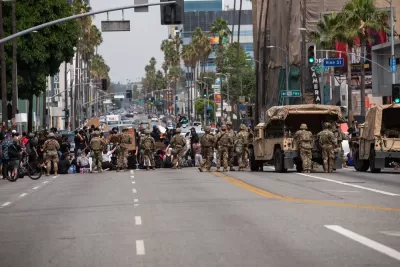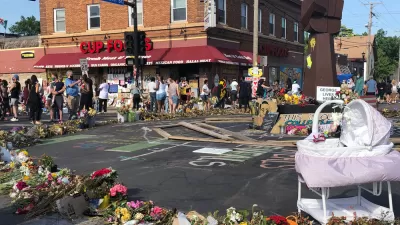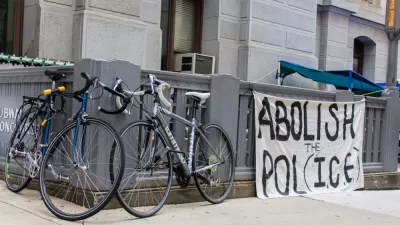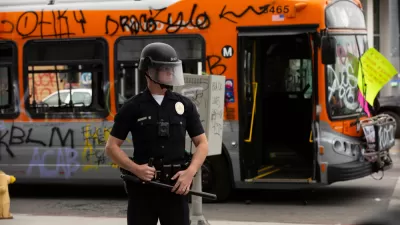An impassioned plea for police not to escalate the violent and angry scenes that have punctuated the peaceful protests of the past week, as desired by key figures in the Trump administration as well as the president himself.

Dallas Morning News Architecture Critic Mark Lamster wrestles with a task facing community leaders in cities all over the world: how to reckon with a past and present defined by institutional racism while protecting people and property.
In an experience mirrored in cities all over the country over the past two weeks, day time hours in Dallas in the past week have been marked by peaceful protest and even a few joyful celebrations of events like graduations and businesses reopening while the night time has been filled filled with violent clashes between police and protestors and destructive acts like arson and looting.
Lamster doesn't generalize about the motivations of protestors, or conflate the righteous indignation of protesters under the same banners as the people who have been indiscriminately looting and destroying property. But he does call for the de-escalation of the conflict, and for a few fundamental characteristics of democracy and peace to be restored:
I refuse to accept violence and destruction against persons and property. I refuse to accept the militarization of public space. I refuse to accept the characterization of the city, in the words of Defense Secretary Mark Esper, as a “battle space.” I refuse to accept the idea that our city and state leaders must “dominate” our streets with military force, as President Donald Trump demanded in a phone call with governors and other officials.
Lamster expresses sympathy for some of the people who have been manifesting anger with the destruction of private and public property—that destruction representing "a tragic breakdown of the American social compact." But the main purpose of the missive is to draw a line—several lines really—in the sand for police and protestors, as more facts and details about how and why these protests have turned violent are revealed.
FULL STORY: Dallas is not a ‘battle space’ and violence is not an answer

Alabama: Trump Terminates Settlements for Black Communities Harmed By Raw Sewage
Trump deemed the landmark civil rights agreement “illegal DEI and environmental justice policy.”

Planetizen Federal Action Tracker
A weekly monitor of how Trump’s orders and actions are impacting planners and planning in America.

The 120 Year Old Tiny Home Villages That Sheltered San Francisco’s Earthquake Refugees
More than a century ago, San Francisco mobilized to house thousands of residents displaced by the 1906 earthquake. Could their strategy offer a model for the present?

Ken Jennings Launches Transit Web Series
The Jeopardy champ wants you to ride public transit.

BLM To Rescind Public Lands Rule
The change will downgrade conservation, once again putting federal land at risk for mining and other extractive uses.

Indy Neighborhood Group Builds Temporary Multi-Use Path
Community members, aided in part by funding from the city, repurposed a vehicle lane to create a protected bike and pedestrian path for the summer season.
Urban Design for Planners 1: Software Tools
This six-course series explores essential urban design concepts using open source software and equips planners with the tools they need to participate fully in the urban design process.
Planning for Universal Design
Learn the tools for implementing Universal Design in planning regulations.
Clanton & Associates, Inc.
Jessamine County Fiscal Court
Institute for Housing and Urban Development Studies (IHS)
City of Grandview
Harvard GSD Executive Education
Toledo-Lucas County Plan Commissions
Salt Lake City
NYU Wagner Graduate School of Public Service





























